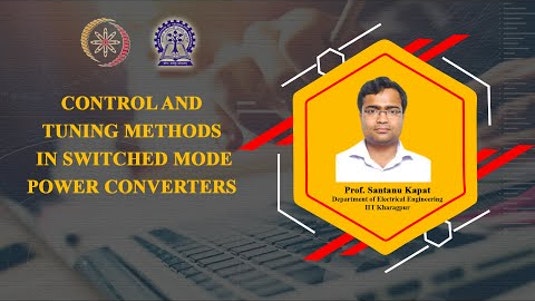Control and Tuning Methods in Switched Mode Power Converters free videos and free material uploaded by Indian Institute of Technology, Kharagpur (IIT Kharagpur). This session contains about Control and Tuning Methods in Switched Mode Power Converters Updated syllabus , Lecture notes , videos , MCQ , Privious Question papers and Toppers Training Provided Training of this course. If Material not uploaded check another subject
Week 1: Switched mode power converters and MATLAB simulation
Week 2: Modulation techniques in SMPCs
Week 3: Fixed frequency control methods
Week 4: Variable frequency control methods
Week 5: Modeling and Analysis techniques in SMPCs
Week 6: Small-signal performance analysis
Week 7: Small-signal design and tuning of PWM voltage mode control
Week 8: Small-signal design of current mode control
Week 9: Large-signal model and nonlinear control
Week 10: Boundary control for time optimal recovery
Week 11: Large-signal controller tuning method
Week 12: Performance comparison and simulation
Switch mode power converters (SMPCs) play the central role in energy-efficient power conversion in emerging applications, such as electric vehicles, data centers, renewable energy, industrial automation, etc. In this context, selection of suitable control and modulation techniques of SMPCs is very important to meet challenging requirements in terms of transient performance, efficiency, line and load regulation, disturbance rejection, etc. While majority of commercial controller implementations are based on pulse width modulation and small-signal analysis, increasing switching frequencies, linking in part to wide bandgap devices, provide the opportunity to increase operating bandwidth and enhance performance. This course (i) presents an overview of conventional modulation and control methods, (ii) identifies small-signal performance limits, (iii) discusses large-signal based control approaches and (iv) compares strategies for controller tuning. Comparison among tuning methods illustrate how large-signal based control tuning methods can significantly improve performance and efficiency of SMPCs followed by the need for digital and mixed-signal control implementation for future power electronics converters.INTENDED AUDIENCE :M.Tech, Ph.D. as well as final year B.Tech students from AICTE approved institutes, design engineers from power management and power electronics industries, such as TI, STMicroelectronics, INTEL, Qualcomm, GE, NXP, Mahindra Electric, HCL, TCS, etc.PREREQUISITES :Qualification (i) BE/B.Tech in Electrical/Electronics Engg. (degree completed or final year UG students) or (ii) PG M.Tech in Power Electronics or Power Systems or Control Systems (degree enrolled or completed) or (iii) one year or more experience in power electronics or power management converters.INDUSTRY SUPPORT :TI, STMicroelectronics, INTEL, Qualcomm, GE, NXP, Mahindra Electric, TCS, HCL Technology, Microchip Technology

- 0 Reviews
- 8 Students
- 351 Courses

Write a public review